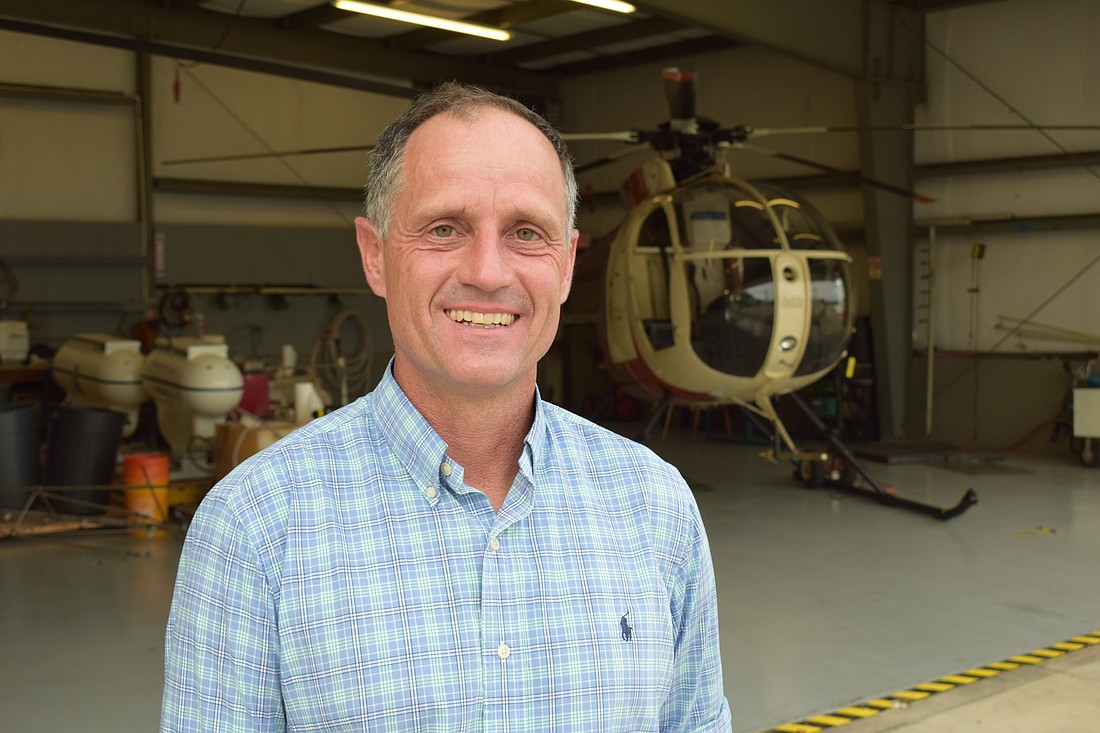- May 3, 2025
-
-
Loading

Loading

Standing in front of a helicopter hanger in Palmetto owned by the Manatee County Mosquito Control District, Chief Pilot Johnny Gardner was blunt after being told some residents were irked by the district's low-flying aircraft.
"Maybe we shouldn't spray for a while and then see what they say," Gardner said.
If Gardner gets a bit intense when asked about the Mosquito Control District's flight plans, it's because he is a retired U.S. Army Black Hawk pilot who spends countless hours making sure his crew goes to extra lengths when it comes to safety training.
"We go above and beyond," said Gardner, who noted the district's pilots are sent for week-long safety courses not required by the FAA. "We've been trained to do this professionally. Talk to your neighbors who have been here a while. They know we're not a nuisance."
While some residents might be annoyed by the noise of a helicopter buzzing over their home at 11 p.m., especially after heavy rains, some see the flight patterns as a safety risk.
Christopher Lesser, the director of the Manatee County Mosquito Control District, said he receives few complaints about the routes taken by his three helicopters, but he said education is a key part of his job and he wants Manatee County residents to understand why the helicopters take the path they do, at the time they do.
Although Lesser said he has spent 25 years of his mosquito control career with a "constant concern" on flight safety during abatement, he said most of the complaints he gets are people concerned with the chemicals sprayed into the air.
"I will get one of two phone calls with people saying, 'I don't want you spraying over our house. I explain to them the EPA (Environmental Protection Agency) deems the chemicals to be safe and then they tend to feel better. And if we don't spray for a while, they will call back and say, 'These mosquitos are horrible.'"
Unlike crop dusting planes that spray chemicals that fall to the ground and cover the plants below, Lesser explained that adult mosquito treatments are much different.
"Agriculture goes right where you spray it," he saidl "We're treating the air."
That's why the spraying can take place right over homes at night. It's when the mosquitos are active, in the air.
The pilots wear night vision goggles and spray at an altitude of about 150 feet. The spray drift is calculated because they want the chemicals to find their targets before they hit the ground.
Gardner said he enjoys his work.
"I've done this for 22 years," he said. "One, I like flying. But I also like the group we have, the camaraderie."
Pilot Mike McCraw works for Gardner after more than 6,000 hours of flight time in the Coast guard. He earned a Distinguished Flying Cross for rescue missions during Hurricane Katrina and he spent most of his military career rescuing mariners in distress.
"Being military, I want to serve the public," he said. "What we do is safe. This man (Gardner) wouldn't let me go up if it wasn't safe."
McCraw said altimeters warn the pilots if their altitude gets too low.
"If you go below the safety margin, a horn goes off," he said.
Lesser said in all his years in the business, he never has seen even a minor accident concerning a helicopter. The closest he ever came to a problem was his own fault.
Although he is not a pilot, Lesser will go up during a spraying run to be more educated about the process, to observe and to support his crew.
Earlier in his career, he went on a flight and had brought his clipboard. On takeoff, he accidentally jammed his clipboard into the controls. The pilot was able to regain control and land safely.
The helicopters carry about 1,000 pounds of Dibrom, Malathion or synthetic pyrethroid on a run. One of the helicopters is a McDonnell Douglas purchased in the 1980s. The other two are Bell 407s that are about 15 years old. They were purchased used in 2018 for $3.4 million (for both).
The three helicopters spray about 1 million acres a year in Manatee County, which is approximately 572,000 acres.
The area that needs to be sprayed each year increases as more homes cover the county. The district collects empirical data to understand areas that require priority spraying, which also can be delivered with trucks. Areas that weren't treated in the past because there were no people in the area, now are being treated.
Lesser and his staff try to keep up. He said mosquitoes spread St. Louis Encephalitis throughout Manatee County is the early 1990s and West Nile was a problem in the early 2000s. Some county residents have suffered from cases of Zika virus. He notes that spraying is just one small part of what his department handles to control mosquitoes.
"We're much like the police," Lesser said "You want to keep a strong presence. We want to control mosquitoes at the nuisance level. We're at the front line of public health."
If he is, indeed, a mosquito policeman, that's OK with Lesser, who holds a bachelor's degree in fishery sciences and a master's degree in aquatic sciences.
"I always felt disenfranchised," he said of following careers in those fields. "I wanted to have an impact on everyday life. So I got involved in mosquito control. Every single day I can have a direct impact on someone's quality of life."
He also wants to let residents know that mosquitos are one of the deadliest living things in the world, killing about 1 million people annually.
"That equates to 11 Boeing 747s crashing to Earth each day," he said.